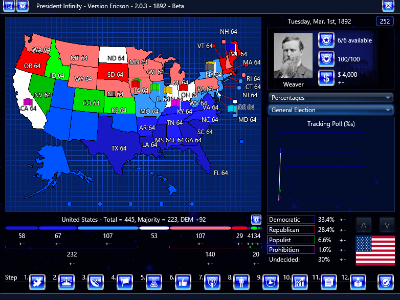*This scenario was greatly updated by the Historical Scenario Commission on August 24, 2017. It can be downloaded here: United States – 1892 v. 2.0
The 1892 election takes place during the Gilded Age, when the major political topics were bimetalism, tariff reform and corruption. President Benjamin Harrison is the incumbent president; however, his first term has been somewhat unpopular among those impacted by the very high McKinley Tariff (named after the future president).
For Republicans, the establishment is rallying around President Harrison, but he faces many delegates from his party hoping to dump him in favor of other popular candidates. Former Republican nominee, and leader of the moderate Republicans, James G. Blaine is one of the “Dump Harrison” candidates, while Governor William McKinley is the favorite “Dump Harrison” nominee among more conservative Republicans.
The Democrats have their own problems. A former president, Grover Cleveland, is the favorite among the conservative and pro-gold, Bourbon Democrat faction, which supports businesses, while pro-Labor, pro-bimetalism Democrats favor Horace Boies. In addition, David B. Hill hopes to be a reform option and Adlai Stevenson is a pro-silver choice for some delegates. Two Bourbon Democrat leaders, John Carlisle and Arthur Gorman, hope to take the leadership position from Grover Cleveland.
The election has a strong third party in the Populist Party, led by James Weaver. The are pro-silver and pro-labor, and they have their support mostly in the West and in the South. Their numbers include many former Democrats and former Republicans. The Prohibition Party is the other third party in this scenario.
This election allows for many what-ifs:
- What if former speaker of the house, Thomas Brackett Reed ran?
- What if Abraham Lincoln’s son, Ambassador Robert Todd Lincoln, listened to his supporters and jumped into the race?
- Senator John Sherman, the brother of General William Tecumseh Sherman, was arguably the most powerful senator at the time, giving his name to the Sherman Anti-Trust Act. Could he be the moderate Republican needed to win the election? He declined to run in real life.
- Rep. Henry Cabot Lodge was the leading proponent for American imperialism. Can an aggressive foreign policy hawk win an election in 1892?
- Governor Robert Pattison was a popular, moderate Democrat. Could he hold the two wings of the party together?
- Richard P. Bland was the leading Silverite (pro-silver) Democrat in congress. Would he be able to win over Populists to the party, without losing Bourbon Democrats to the Republican Party?
- Leonidas Polk was the front-runner for the Populist Party, but he died. What if he had lived? Could he have increased the party’s fortunes?
Feedback is desired. Updates will be forthcoming.

